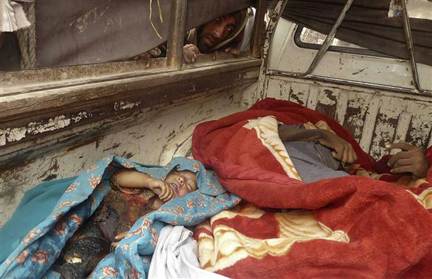
An Afghan man looks over the dead bodies of people killed by coalition forces in Kandahar province, March 11, 2012. Afghanistan’s defence ministry said coalition forces killed 15 civilians in a shooting spree in Kandahar province on Sunday.
Photograph by: AHMAD NADEEM, REUTERS
The senseless killing of more than a dozen Afghan villagers, while they slept, by a U.S. soldier has captured the headlines worldwide. Many of these headlines are variants of “In Afghan Civilian Killing Rampage, U.S. Soldier May Have Gone ‘Berserk'” The choice of “berserk” to describe this act is telling, since the word itself derives from old Norsk in reference to, as the OED puts it, “A wild Norse warrior, who fought with frenzied fury.” In the Norse legend, however, the warrior had a cause, while the Rambo-rampage here was a solo act, a random act as far as war strategy is concerned. The explanation that immediately comes to mind is that he “lost his marbles,” perhaps because those marbles had been jostled too many times during his three tours in Iraq.
A few days ago a court in Norway ruled that Anders Behring Breivik, “the 33-year-old right-wing extremist psychotic,” as USA Today terms him, might go to a psychiatric ward rather than prison for his “bomb and shooting rampage” that left 77 people, many who were young people, dead. News reports also labeled Breivik as someone “gone berserk.” But neither in Norway nor Kandahar do the men who aimed their guns at innocent victims demonstrate any kind of courage in the “just war” alibi. The old Norse warrior Berserk exuded raw courage, battling without armor and with the intensity of a bear or wolf. Of course, he was not a good man, having killed his wife after she delivered 12 sons (or so we are told in legend), but his battle-axe was aimed at fellow warriors, not sleeping children. One can understand, even if it is hard to appreciate, the fury of a battle, when blood runs hot as it is slashed out of bodies in hand-to-hand combat. But is “berserk” really the right word for deliberate singling out of men, women and children that in all normality are innocent?
Let me introduce a third b-word into these thoughts. In Islamic cosmology there is a stage between physical death and resurrection, an intermediate stage in which the body and soul are in a kind of “cold storage” until the world-culminating Day of Judgment. Sufi scholars like al-Suhrawardi viewed this limbo as a world of images in suspension, drawing on the metaphor given in the Quran (55:19-20): “He released the two bodies of [fresh and salt] water. They meet, yet there is a barrier between them they do not cross.” For Ibn ‘Arabi this was the meeting point of the sea of sensory objects and the sea of spiritual meaning, where the wholeness of body and soul is indistinguishable, where what we accept daily as reality becomes another kind of reality. If we treat this notion as metaphor rather than what some would dismiss as simply a crazy religious doctrine, then barzakh can stand for the in-betweenness in which rational meaning (and acting normally) no longer functions as the dominant interpreter of life. To the naked eye water is water, it is the taste that discovers the salt that makes ocean water not fit to drink. To our minds, we see two acts of violence against innocents, but in the mind of both perpetrators these acts “made sense” to them in the moment. Their minds were in the kind of limbo that no longer commanded their body to act the way the rules say they should act.
There is no evidence that either killer acted out of frenzy, firing back as some enemy’s bullets whizzed by them or into them. Both acts appear to be thought-out (not matter what you think of the sanity of those thoughts), planned and carried out in a cold, calculated way. I do not see either man as “berserk” in the old Norse sense; our modern sense is fuzzy enough that it can cover a wide variety of behavior that we see as abnormal. I do see both individuals caught in a neurological barzakh, a stage in which the normality of life is suspended and an imaginary creates a new normal, a dangerous new normal that only seems new but is probably as old as our species. When individuals go here, they are deemed crazy. Ye, when states create the same results, dropping bombs and missiles on civilians, ordering tanks into heavily populated urban neighborhoods, sending out the police in riot gear, no one calls this berserk unless it is something done by a that other defined enemy. Are calculated acts that result in the deaths of innocents no less a result of entering barzakh, a limbo where right and wrong or evil and good are in suspension, if done by states, armies, hate groups or individuals? Breivik and the as yet-unnamed American soldier, or Jared Lee Loughner or any of the other “lone” assassins that make the headlines can easily be dismissed as having gone berserk. But why is the very act of killing itself, no matter who pulls the trigger or pushes the button that releases the missile, not berserk when it is not the loner entering his own imagined barzakh?
Daniel Martin Varisco